©
2004 Jeff Matthews & napoli.com
Ugliness
| In
"Kant's Problems with Ugliness," the author argues that Kant's
attempt in the third Critique to overcome the gulf between the
realms of nature and freedom, by showing that the natural or phenomenal
world is receptive to the efficacy of pure practical reason, is
incompatible with the existence of ugliness…This argument,
I suggest, rests on a failure to recognize Kant's distinction
between aesthetic and teleological reflective judgment, and evinces
a misunderstanding of the complex and delicate relationship which
Kant constructs on the one hand and morality on the other. (The
Journal of Aesthetics and Art Criticism 50:4 Fall 1992 |
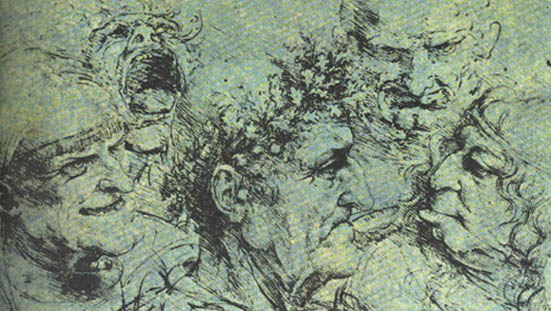 I
couldn't agree more. Or maybe I couldn't disagree more. Anyway, it got
me thinking about 'ugly'. I didn't grow up with the concept of 'ugly'.
'Beautiful,' yes: so and so was "good looking," "beautiful," "handsome,"
etc. , but we never called people "ugly". Negative adjectives usually
referred to personality rather than physical appearance. Thus, a handsome
guy could still be a 'jerk' or 'creep,' and my middle-aged feel for
more recent coinages such as 'nerd' and 'dweeb' tell me that the same
is true of them. I wasn't truly made aware of 'ugly' until I moved to
Naples. I
couldn't agree more. Or maybe I couldn't disagree more. Anyway, it got
me thinking about 'ugly'. I didn't grow up with the concept of 'ugly'.
'Beautiful,' yes: so and so was "good looking," "beautiful," "handsome,"
etc. , but we never called people "ugly". Negative adjectives usually
referred to personality rather than physical appearance. Thus, a handsome
guy could still be a 'jerk' or 'creep,' and my middle-aged feel for
more recent coinages such as 'nerd' and 'dweeb' tell me that the same
is true of them. I wasn't truly made aware of 'ugly' until I moved to
Naples.
A short
time after I barreled my lock and stock into a rather large Neapolitan
extended family, I ran into one of my extensions on the cable car. I
knew he was a relative becauseI had met him at a family outing, but
I really had no idea exactly who he was. Keeping track of my in-laws
is an exercise in kinship anthropology of Dostoyevskian proportions.
(You will recall that Sergei's second cousin's niece's sister, Anna,
whose grandmother's stepbrother, Maxim, is really the bastard son of
Lt. Kasov's uncle, has been using her maiden name ever since page 445,
just to keep you on your toes.) Anyway, (you can get off your toes,
now —or at least get off mine) he (my relative, not Dostoyevsky—pay
attention!) recognized me and called me by name, but I couldn't place
him. When I reported the incident to my wife, she asked: "Who
was it?"
"I don't
know."
"Well, what did he look like?"
"Hair, arms, legs, the usual things. Nice little guy. Getting along
in years. Very amiable."
"Was he ugly?"
Was he
ugly?! Now, that was the first time in my life that I had ever
heard that question! Forget Caucasian male, medium build, receding hairline,
aquiline nose, high cheekbones, lantern-jawed, almond-eyed, brachycephalic,
identifying marks, scars or tattoos. Why, yes, officer, I can describe
the suspect exactly: he was ugly! How ugly was he? Well, I'll tellya!
Why, he was so ugly …(cue the drummer for a rim-shot) …we
didn't know if that was his face or whether his neck simply had a bad
case of acne! (ka-bam!) Why, his mother used to put a sack over
her own head when she breast-fed him! (ba-boom!) She tried putting one
over his head once, too, but she got arrested for bag abuse! (ba-da-boom!)
Why, he was so ugly, he looked in a mirror once and he broke!
(Forget it. Shoot the drummer.)
"Huh?"
I answered. "I don't know."
"What do you mean, you don't know. Either someone is ugly or he's not!"
When my
wife found out from the family grapevine (a Beaujolais-sized vineyard,
really) who I was talking about, she couldn't believe it.
"How can
you possibly say he's not ugly?! He's the ugliest one in the whole family!"
"But…," I sputtered, "…you just can't say that about someone!"
"Why not? It's not his fault, just like it's not someone else's merit
to be good-looking. God got distracted and let the clay sit too long,
that's all." I was relieved to know that when you're working with hydrous
aluminum silicates, even He is not perfect.
Indeed,
in Naples, as in much of the world, 'ugly' is no big deal. Leonardo
did some of his most marvelous sketches of ugly persons (illustration,
above). Ghandi was ugly. Mother Theresa was ugly. Gorillas are ugly—big
lovable cuddly creatures who would share their last banana with you.
But they're ugly. And so what.
Bureaucracy,
getting by
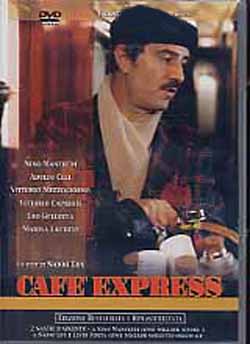 There
are many ways to "arrangiarsi" or "get by" in this part of the
world. In the film Caffè Express, with Nino Manfredi,
the main character wanders the corridors of an express train selling
coffee illegally. He prepares the coffee at home, puts on his
homemade uniform, gets on the train and goes to work, always staying
a step ahead of the conductor. Much Neapolitan humor deals with this
figure of the 'survivor,' the one who will do anything to make a living.
Wait -- not anything. The true Neapolitan survivor will not steal. That
is undignified and carries no honor or sense of achievement with it.
The real 'survivor' offers a service or a product. Those who offer—perhaps
a bit forcefully at times—to wash the windshield of your car while
you're stopped in traffic are an example, as are the vendors of kleenex
and cigarettes. They are at the bottom of the list in terms of creativity,
however. There
are many ways to "arrangiarsi" or "get by" in this part of the
world. In the film Caffè Express, with Nino Manfredi,
the main character wanders the corridors of an express train selling
coffee illegally. He prepares the coffee at home, puts on his
homemade uniform, gets on the train and goes to work, always staying
a step ahead of the conductor. Much Neapolitan humor deals with this
figure of the 'survivor,' the one who will do anything to make a living.
Wait -- not anything. The true Neapolitan survivor will not steal. That
is undignified and carries no honor or sense of achievement with it.
The real 'survivor' offers a service or a product. Those who offer—perhaps
a bit forcefully at times—to wash the windshield of your car while
you're stopped in traffic are an example, as are the vendors of kleenex
and cigarettes. They are at the bottom of the list in terms of creativity,
however.
A better
example would be Massimo Colatosti, who may have been be the only person
in the world to wish for monster traffic jams every morning when
he awakened, and who had a very good job until cell phones became
so common. Massimo wandered from car to car offering cell phone service
to those who were stuck in traffic and who needed to make a call.
Apparently, he was a gentleman and didn't charge if the caller was ill
and had to make an emergency call. On the other hand, if it was just
young lovers who wanted to whisper sweet nothings, Massimo charged
them sweet somethings. He charged men more than he charged women. The
true survivor is nothing if not chivalrous.
There is
another kind of job that is necessary—but shouldn't be. It's not
a street corner job, either. There are respectable little offices called
"agencies". The sign in the window tells you they take care of driving
licenses, birth certificates, residence papers, this document, that
paper, etc. etc. If, for example, you need a document to attest to the
fact that you have no criminal record, you can go in there, pay some
money and come back a few days later to find your papers all in order
and waiting for you. But, you say, couldn't you do that yourself just
by going to the appropriate office at the City Hall? Yes—if
you want to stand in line. If you wander into the city hall or police
station or hall of records looking for just the right wayward
scrap of paper with your name on it—well, you can kiss the whole
day "good-bye". The bureaucracy in Naples is Byzantine; indeed, the
Greeks invented Catch-22 (You can't do A before you do B; but in order
to do B, you have to show that you have done A). Pythagoras, himself,
is said to have been trying to prove that there was a number between
21 and 23. Maybe the Neapolitan version has to do with the still proud
attachment that Naples has to its Greek roots and traditions, or maybe
it's just that everyone needs a job. This is one more way to "get by".
You are essentially paying an outrageous amount of money to "queue standers".
That's all they do. They put in the time so you don't have to.
They make
a good living, too. I understand that it is even a profession passed
on from father to son, just as were the noble trades of yesteryear:
the silversmith, the carpenter, the luthier—and, now, the guy
who waits in line. "Yes, my boy," says Father (sweeping his arm out
in a grand gesture to show his son the 432 people in front of them in
the queue), "some day, all this will be yours."
Christmas
(2)--the Wishing Tree
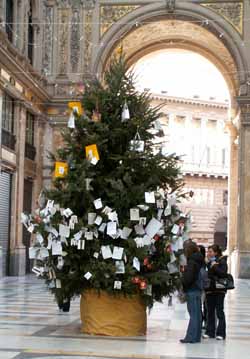 Well,
the stolen "wishing tree" has been found, and all is well once again
in the Galleria Umberto. As noted in
another entry, the tradition of the Christmas
tree is a relatively recent one in southern Italy, yet it is already
an established practice to erect one or two of them in the gallery.
They then become not just Christmas trees, but "wishing trees" -- that
is, people write wishes on slips of paper and put them in the branches
of the tree. This is in keeping with an age-old similar ritual with
religious statues and some monuments in the city. When they restored
the statue in Piazzetta Nilo some years
ago, a number of such scraps of paper were found wedged in the cracks. Well,
the stolen "wishing tree" has been found, and all is well once again
in the Galleria Umberto. As noted in
another entry, the tradition of the Christmas
tree is a relatively recent one in southern Italy, yet it is already
an established practice to erect one or two of them in the gallery.
They then become not just Christmas trees, but "wishing trees" -- that
is, people write wishes on slips of paper and put them in the branches
of the tree. This is in keeping with an age-old similar ritual with
religious statues and some monuments in the city. When they restored
the statue in Piazzetta Nilo some years
ago, a number of such scraps of paper were found wedged in the cracks.
This year,
a local businessman, Antonio Barbaro, donated two 25-foot silver pines
to the gallery. The other night, one of them was snatched away at midnight
by a band of a dozen kids who hauled it two blocks away into the rough
Spanish Quarter of the city. They cops
found the tree a few hours later and called Barbaro. He said it had
just been a prank by some teenagers who wanted a Christmas tree. "Leave
it there," he said. "I grew up in that quarter. They have some wishes
of their own to put in the tree." He replaced the tree in the gallery.
Yesterday
I stood at the tree in the Gallery reading the wishes. Some of the slips
of paper are addressed to "Babbo Natale"—Father Christmas. Some
are to "Baby Jesus". Almost none of them are for personal gain—no
"please give me a motor scooter" sort of thing. Many of the wishes are
broadly benevolent—peace in the world, no war, make next year
better than this one, etc. Some are simple, personal and heart-rending—"Please
make my mother well again." One was delightful: "We're in love
and don't need anything else, but thanks anyway!" One was outrageously
alien to the spirit of the season: "Please kill Berlusconi [the Prime
Minister of Italy] and get Naples back in the 'A League' [the top division
in Italian soccer]."
After the
holidays, the "best" wishes will be printed in book format and sold.
This year, the proceeds will go to a fund to combat genetic disease.
Smorfia;
luck (good & bad) (1); dreams (1)
I dream
of Jeannie with the light brown hair. —Stephen Foster
Behold,
I have dreamed a dream more; and behold, the sun and the moon
and the eleven stars made obeisance to me. — Joseph
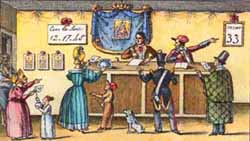 "La
smorfia" is a book that details the Neapolitan tradition of
interpreting dreams by associating them with numbers and then betting
those numbers in the state lottery, Lotto. Whether your dreams run to
the songs of Stephen Foster, or the Book of Genesis, "la smorfia"
may be the way to finally pan some true nuggets from your nightly rivers
of surrealism. "La
smorfia" is a book that details the Neapolitan tradition of
interpreting dreams by associating them with numbers and then betting
those numbers in the state lottery, Lotto. Whether your dreams run to
the songs of Stephen Foster, or the Book of Genesis, "la smorfia"
may be the way to finally pan some true nuggets from your nightly rivers
of surrealism.
Traditional
dream themes in la smorfia cover everything from water to death
to dawn to money, sex, trips, birds, blood, accidents, family, food
and any change, twist or perversion of the human condition you
could possibly—well, dream up. Most Neapolitans on the street
know at least a few numbers of la smorfia. If you dream of God
or Italy, then play number 1; an insane person is 22; if you are frightened
by a dream, bet 90.
It is technically
permitted to play a single number, but the payoff from the tightwad
state is so paltry that most people look for secondary interpretations
in their dreams. Instead of playing simply 90 for "fear", imagine that
you dream of being frightened by an insane person. Then you play
both 22 and 90. If—follow closely—you are badly frightened
by an insane person carrying a bowl of soup (68), then the Cosmic
Numbers Runner is trying to tell you to bet the farm on all three of
those numbers.
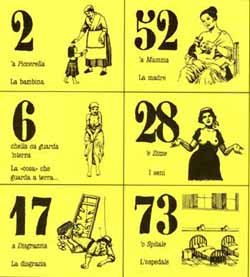 Each
week in ten Italian cities, the lotto drawing selects at random five
numbers from one to ninety. Betting two numbers is called ambo;
it pays off at 250 times your original bet. You can bet on
three numbers, terno; four, quaterna or all five, cinquina. These
pay off, respectively, 4,250 times, 80,000 times, and one million
times whatever you bet. So, if you decided to plunk down one euro (about
one US dollar), a normal wager, on your hot terno of 22, 68 and 90,
and those three are among the five drawn, you win €4,250. There
are various possibilities for splitting your bet and even for playing
the lotto numbers in other cities. There is a limit to the amount you
are allowed to bet on a cinquina, but most people with a "sure thing"
simply play different tickets. The tickets are anonymous and no one
will know that the measly €5 you had riding on the cinquina revealed
unto you in that dream …you remember… when she did that
thing with the… and you were… right, that dream —no
one will know about that million to one payoff until you back your truck
up to the bank. Each
week in ten Italian cities, the lotto drawing selects at random five
numbers from one to ninety. Betting two numbers is called ambo;
it pays off at 250 times your original bet. You can bet on
three numbers, terno; four, quaterna or all five, cinquina. These
pay off, respectively, 4,250 times, 80,000 times, and one million
times whatever you bet. So, if you decided to plunk down one euro (about
one US dollar), a normal wager, on your hot terno of 22, 68 and 90,
and those three are among the five drawn, you win €4,250. There
are various possibilities for splitting your bet and even for playing
the lotto numbers in other cities. There is a limit to the amount you
are allowed to bet on a cinquina, but most people with a "sure thing"
simply play different tickets. The tickets are anonymous and no one
will know that the measly €5 you had riding on the cinquina revealed
unto you in that dream …you remember… when she did that
thing with the… and you were… right, that dream —no
one will know about that million to one payoff until you back your truck
up to the bank.
If you
have ever really dreamed of Jeannie with the light brown hair,
you have a few options open to you, depending on just what she is doing:
dancing, 37; crying, 21; riding a bicycle, 79. If your dream
is so true to song that she is, indeed, "tripping where the bright streams
play," then you may have to do some fancy interpretation, but that's
half the fun. Dreaming of a woman's hair, however, is a 55, so, again,
you have at least an ambo. Joseph's dream would certainly be regarded
as portentous. It requires knowing the numbers associated by popular
tradition with stars, the sun, bowing down, etc. There is a good
terno in there.
One expects
to find all the eternal themes of love, death, family, etc. represented
in folklore, but it's amazing how quickly popular tradition updates
itself. When the great soccer star, Diego Maradona, was playing for
Naples, and he happened to dribble through one of your dreams, he was
a 43, because 1 (God) plus 42 (football player) equals "a God of a player,"
("nu dio 'e giocatore"), as they say in Naples.
You'll
have a hard time convincing thousands of years of tribal shamans and
decades of our own domestic headshrinkers that dreams are meaningless.
To centuries of Neapolitans, as well, they are anything but. So if you're
curious about that dream of the clarinet falling on and killing your
canary —sure, it might be nothing: maybe you just turned over
too quickly last night and knocked some of the pictures off the walls
in your head, that's all. On the other hand, it might mean 50
(clarinet) and 90 (dead canary), in which case you're in
business. Sweet dreams.
Neapolitan
language
If you
have studied Italian formally, you probably recognize this:
"Nel
mezzo del cammin di nostra vita
mi ritrovai per una selva oscura,
ché la diritta via era smaritta..."
That is,
of course, the opening of Dante's Divina Commedia. It is
one of the most famous passages in all literature and if you still remember
it, you don't need me to tell you what a gentleperson and scholar you
are. You also don't need me to point out to you the exquisite uselessness
of that passage—in spite of the fact that it mentions being lost—when
you're trying to find the main train station in Naples, for then you
may find yourself having to deal with so-called 'non-standard' Italian,
a dialect.
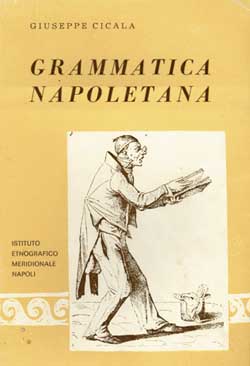 In
Naples you are surrounded by the sounds of an ancient, rich, bawdy,
colorful language, one of the most interesting tongues still wagging
anywhere in Italy and one which to the ears of puzzled newcomers
seems to have only peripherally to do with the national language. In
Naples you are surrounded by the sounds of an ancient, rich, bawdy,
colorful language, one of the most interesting tongues still wagging
anywhere in Italy and one which to the ears of puzzled newcomers
seems to have only peripherally to do with the national language.
Discussions
of language bog down in questions of "language" vs. "dialect".
It's like the difference between "cult" and "religion". A religion
is a cult with political power, and similarly, as Latin splintered
along with the Roman Empire, the pieces—dialects—became
"real" languages when the people who spoke that particular brand of
vulgate Latin got enough clout to declare that theirs was the official
language of the area they lived in. The reason we have Spanish, Portuguese,
Italian and French is that we first had Spain, Portugal, Italy and France. Until
the unification of Italy in the last century the Latin "splinter"
spoken in Naples was the language of the Kingdom of Naples. When Naples
became part of the Kingdom of Italy, the language was relegated to being
"just" a dialect, because the new official language of united Italy
was based, for various literary, historical and political reasons on
Tuscan, the central Italian dialect of Dante.
Typical
Neapolitan expressions are: "Tiene 'a capa sulo per spartere
'e rrecchie!" Roughly: "The only thing your head is good for
is to keep your ears apart!" or "Storta va, deritta vene"
, (it leaves crooked and comes back straight), the sense of which is
that "Each cloud has a silver lining," and "Chiacchiere e tabacchere
'e lignamme nun s' mpegnano—literally: "You can't pawn talk
and wooden snuff boxes", meaning, "Talk is cheap."
Neapolitan
has Latinisms long since gone out of standard Italian, such as mo'
for "now" (from the Latin modum ). It has influences from Spanish,
such as cu mico and cu tico, instead of the
Italian con me and con te. It has words such as sfizio,
for which there is no Italian equivalent, and which has found its way
into use in standard Italian. Sfizio is the satisfaction
one gets from doing something "just for the hell of it". In the outlying
areas near Naples, they still have words such as craje, for "tomorrow"—a
word that came ashore with Ulysses. That there is Greek in Neapolitan
shouldn't be surprising, since Naples was a Greek colony before Romulus
had even learned how to spell "empire". 'Napoli' comes from Neapolis—"new
city"—and other place names, less obvious, are abundant: 'Posillipo'
is from Pavsillipon, Greek for "the place where unhappiness
ends."
Phonetically,
Neapolitan is very interesting. One of the most obvious sounds
is what phoneticians call the "schwa", a neutral, central vowel, the
"uh" sound of unaccented syllables in many languages: English, Russian,
Neapolitan (but not Italian)—the 'a' in 'ago', for example. A
dead giveaway that a northern Italian is trying to sing 'O Sole Mio
is the mispronunciation of the final vowels as pure Italian
'ay' and 'oh,' instead of 'uh' and 'uh'. It is the most characteristic
of all sounds in Neapolitan.
There are
even Neapolitan vowels and consonants traceable to the languages
of the pre-Roman peoples of Campania, the Oscans and the Samnites. We
forget that before Latin in this area, there was Greek, and before
and alongside Greek there were other local languages, none of
which have survived. Latin met with more resistance in Campania than
elsewhere on the peninsula as the Empire spread out from Rome. Even
back then, people in this neck of the woods were stubborn. The
Roman historian Livius reports that a delegation from Cuma had to go
all the way to Rome in 180 BC and have Latin declared the
official language down here in order to get the folks in the local markets
to stop speaking Oscan! Even then, it was noted, the people in
this area still pronounced Latin with a local accent.
Among the
many grammatical peculiarities of Neapolitan is the post-positioning
of some possessives with family members. "A sorete"
(to sister-yours) as a return insult, means roughly: "The same goes
for your sister, buddy!" The proper pronunciation of the final vowel
as "uh" (see above) also qualifies you for participation in the ancient
and stirring ritual of The Laying On Of Fists.
Neapolitan
has survived and thrived magnificently as a vehicle of expression
for such Neapolitan greats as the playwright/ philosopher Eduardo
de Filippo and the poet/ clown Totò,
both of whom, in their own inimitable ways, are the essence of Napolitanità—the
ability of the common people to retain their dignity in the face of
adversity, to resist being overwhelmed by external forces. This applies
to language, as well—maybe especially language, whether
it's Oscan, Greek, Latin, Spanish, French or, recently,
English. Resist, change it, make it your own, but don't be overwhelmed.
Don't give in.
Here, get
a load of this:
A mezz'
età mettenneme 'n cammino,
io me truvaie pe' na furesta nera,
pecché m'ero 'mbriacato senza vino.
They have
even translated La Divina Commedia into Neapolitan! How's
that for not giving in?!
[Most
people know a little bit of Neapolitan dialect from famous Neapolitan
songs such as 'O Sole Mio. To read about the Neapolitan Song,
click here.
To view some of the texts of the songs themselves, in dialect, click
here.
To read about the Neapolitan dialect and Salvatore Di Giacomo, see
here.]
The oldest collection of European fairy-tales is in Neapolitan. To
read about that, click here.]
Croce,
Benedetto
(1) (1866-1952)
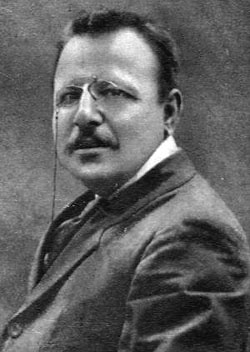 One
has to know a lot about philosophy, history, literature, aesthetics
and various theories of criticism in order to do justice to the topic
of Benedetto Croce. Someone like me, then, will clearly have to start
somewhere else, such as telling you what fascinates me most about this
man. One
has to know a lot about philosophy, history, literature, aesthetics
and various theories of criticism in order to do justice to the topic
of Benedetto Croce. Someone like me, then, will clearly have to start
somewhere else, such as telling you what fascinates me most about this
man.
It is this.
When Croce died in Naples in November, 1952, his funeral procession
was an outpouring of popular emotion and affection. Thousands of common
citizens spontaneously spilled into the streets to say farewell to one
who has been described as the most important Italian philosopher and
historian of the twentieth century, and who, they say, blew a hurricane
of freshness into the stagnant hot-air that had been implacably settling
over the Italian intellectual landscape for centuries, perhaps since
the Renaissance.
How is
it that an intellectual had such an appeal among the people? Maybe the
key is in the word "intellectual". There is in the word, itself, a nasty
undercurrent of arrogance, which holds that the life of the mind and
the life of—well, the life of life, itself—are separate,
and that those things worth knowing in life must be couched in terms
that cannot be readily understood. It is as if the mind were a separate
kingdom ruled by only a select few. Among such people you will find
at least a few of Croce's detractors, those who view him as a great
"popularizer," or, to use the Italian phrase, a "vulgarizer" of culture.
(Perhaps one should be wary of intellectuals who are wary of vulgarizers.
Those who feel this way about Croce might well have felt the same way
about Dante, who chose the terribly vulgar path of writing the single
most sublime poem in Western literature, La Divina Commedia,
in Italian, the language of the people, and not in Latin, the language
of the select.)
If what
I have said is a fair description of at least some intellectuals,
than that is what Croce definitely was not, and therein lies his appeal
to many. There is undeniably something in the Neapolitan character—and,
indeed, in all of us throughout the ages and across cultures—that
loves, respects and identifies with very simple and very intelligent
persons, those we term "wise".
Croce was
just such a simple person. His early life was struck violently by tragedy
when his parents and sister were killed in the great earthquake that
struck the island of Ischia where they were staying in 1883. He, himself,
was buried beneath the rubble for hours before being rescued. His parents'
estate left him enough money to live and to write. He dropped out of
the university to pursue education on his own, and wound up as Italy's
Minister of Education, a scholar respected the world over, one whose
collected works comprise seventy volumes and range over a mind-boggling
array of disciplines. In literature, he wrote about Shakespeare, Dante,
Goethe, virtually all of Western literature. He wrote histories of Naples,
of Italy, of Europe, and he wrote over a broad spectrum of philosophical
and general cultural matters. Croce may almost single-handedly have
been the cultural version of the risorgimento (the political
movement to unify Italy.) Cavour, in referring to the unification, said
"We have made Italy. Now let us make Italians." Croce perhaps helped
to "make Italians," culturally speaking, by providing them with a broad
unified cultural background. He founded his journal, La Critica
in 1903 and for 41 years published his own writing as well as reviewing
important European historical, philosophical and literary work of the
times. He said of his own magazine that "La Critica was the most
direct service I could render to Italian culture, uniting the role of
a student and of a citizen."
In discussing
Croce's philosophy, we may simply note here that Italian philosophy
had never been through the paradigm-wrenching experience of a Reformation.
As such, Croce had to create his own internal Reformation, divorcing
himself from the medieval nitpicking that still plagued even 19th century
Italian philosophy. (It is true that he took an almost Germanic delight,
alà Hegel, in subtle distinctions and classification, but, alas,
there may be some truth in Spinoza's warning that, "That which is excellent
is difficult"!) Yet, his language is eminently approachable, and, indeed,
the term 'utility' crops up so often in his writings, that even if 'pragmatic,'
(as a technical philosophical term) does not apply to Croce, at the
very least, he succeeded in moving Italian intellectual thought away
from religious scholasticism into the mainstream of European humanist
philosophy.
This human
approach is nowhere clearer than in his definition of history.
"Historical
judgement is not a variety of knowledge, it is knowledge itself; it
is the form which completely fills and exhausts the field of knowing,
leaving no room for anything else."
This idea
that everything takes place within history rings true to many. History,
after all, is not something that runs along beside you, "doing history,"
as it were, while you do something else. All of the 'something else's'
that you do—write, paint, work—are history. The soldier
who dies in a war has made the ultimate sacrifice on the altar of some
historical process or other, just as the woman who waits in line three
hours for bread is an integral part of larger macroeconomics. Yet, this
commonsense view of history has not been all that clear to many, who
have chosen to view their searches for truth, for God, for music, for
art, for whatever, as something that transcends life instead of being
part of it. It is true that this view of history as being all-encompassing
leaves no room for the transcendental, and Croce, from a devout Catholic
family, was an atheist, feeling that "philosophy removes from religion
all reason for existing."
There is
a story about Mozart that may shed some light on Croce's view of the
age-old question in aesthetics: What is beauty? Mozart used to sit in
crowded pubs, eating, drinking and chatting with his friends, surrounded
by the constant hubbub common to such places. When asked how he could
compose music with all the racket going on, he said that the music was
already composed in his head and that he was merely copying out the
parts! There is a school of aesthetics, of which Croce is a leading
member, that holds that art and beauty exist in their perfect and complete
form the minute they are conceived by the artist. The actual sculpting,
writing, painting, etc. is merely "copying out the parts". The opposing
view, of course, claims it is absurd to think that Michelangelo's mere
thought of David is beauty. Surely it is the manifestation of
the idea that is beauty! Surely, you need the statue! If that makes
intuitive sense to you, you are not alone, but ask yourself the question
presented in the counter-argument: Why, then, do you even go to see
the original in Florence when there are copies to be seen elsewhere
that are indistinguishable from it? Are you not going to somehow 'see'
or be in the presence of the idea, the original idea, which can only
inhere in the original work? Yes, you can look at a copy and like it
--ah, but behold the original! Is there anyone at all who would say
there is no difference? Even Croce's critics who scoff at such Idealism?!
There is
in Croce's writing a certain melancholy at his own lack of the intuitive
lyricism from which he felt true artistic beauty springs, yet he insisted
that art and beauty were for Everyone—that all of us, creative
or not, have the intuitive ability to at least tune in to the original
creative idea by tracing back to it through its physical manifestation
as a painting, a poem, a piece of music. That, he felt, was the essence
of appreciating beauty: our ability to approach the Idea.
Croce's
view of the individual in history makes him particularly important in
20th century Italy. Croce has rightly been called the Historian of Liberty,
one who viewed all of history as a stage upon which the struggle for
freedom is played out. Under Fascism in Italy, Croce was the anchor
of the intellectual resistance, and after the war, he rightfully assumed
his place as a sort of Grand Old Man of Liberty, one upon whom even
the president of the Italian Republic came calling when in Naples.
And that
is the Grand Old Wise Man the people of this city turned out to say
good-bye to.
[See
here for a wartime episode involving Croce.]
Pompei (2); spirits (good &
evil) (2)
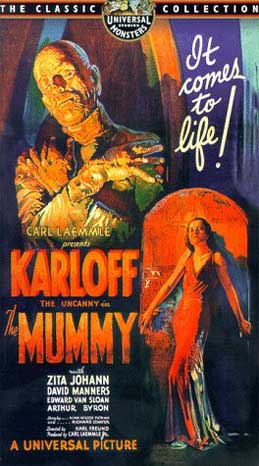 In
1932, Universal studios released a prototypal horror film called The
Mummy. It starred Boris Karloff and was magnificently eerie, much
better than the slew of potboiler imitations that followed. It was a
film loosely generated by popular buzz of the day surrounding the curse
supposedly attached to the tomb of King Tuthankhamen ('Tut', for the
tongue-tied), discovered (or desecrated, depending on whether you are
an archaeologist or an ancient Egyptian) in 1922 by two Englishmen,
Howard Carter and George E.S.M. Herbert, fifth Earl of Carnarvon. In
the antechamber of the tomb they found a plain clay tablet on which
were inscribed hieroglyphics reading, "Death will slay with his wings
whoever disturbs the peace of the pharaoh." Within seven years,
22 persons involved with the discovery and excavation of the tomb had
died untimely deaths. In
1932, Universal studios released a prototypal horror film called The
Mummy. It starred Boris Karloff and was magnificently eerie, much
better than the slew of potboiler imitations that followed. It was a
film loosely generated by popular buzz of the day surrounding the curse
supposedly attached to the tomb of King Tuthankhamen ('Tut', for the
tongue-tied), discovered (or desecrated, depending on whether you are
an archaeologist or an ancient Egyptian) in 1922 by two Englishmen,
Howard Carter and George E.S.M. Herbert, fifth Earl of Carnarvon. In
the antechamber of the tomb they found a plain clay tablet on which
were inscribed hieroglyphics reading, "Death will slay with his wings
whoever disturbs the peace of the pharaoh." Within seven years,
22 persons involved with the discovery and excavation of the tomb had
died untimely deaths.
In Naples,
we may have material for another film. It is not uncommon for the superintendent
of the archaeological site at Pompeii to come to work and find envelopes
and small packages containing bits and pieces of antiquity, items from
the ruins of Pompeii, pilfered and then sent back by sticky-fingered
tourists haunted by remorse.
But are
they haunted by something else? Could be, because sometimes letters
accompany the booty. Some time ago, a package arrived full of objects
stolen from Pompeii. It was from Valencia in Spain. The penitent thief
claimed to have had nothing but terrible luck ever since he swiped the
objects. He lost his job and was then plagued by family problems; the
sender was convinced that he was the victim of a curse put on the objects
two thousand years ago by devious citizens of Pompeii who wanted to
protect their belongings down through the ages.
The superintendent
has had goods returned from as near as Castellammare and as far away
as Poland. The senders' names and addresses are usually bogus, but a
number of them contain letters with the same general message: "Bad luck
ever since I took the stuff. Please take it back. Release me from
the curse." The good superintendent, of course, refuses to pronounce
judgment on such things as ancient curses, but if it gets his stuff
back, who is he to tell you what you should or shouldn't believe?
Personally,
I think that the people who sell tissues, wash your windshields and
hustle cigarettes at traffic lights in Naples are missing a golden opportunity.
In a city where astrologers and soothsayers openly advertise, and where
everyone in my family, including me, believes in the evil-eye, why not
put curses on personal property? Cars, for example. It would be a symbolic
way of saying, "Death will slay with his wings whoever touches my wheels."
Maybe a brief incantation at the stoplight, then a quick exchange of
a euro or two for an amulet, possibly in the image of Boris Karloff,
with an adhesive backing so you can slap him up there on the dashboard
right next to whatever other medallions you happen to have protecting
you. Sort of a double-whammy.
Added bonus:
if your car is tampered with in the middle of the night, ancient curses
don't go off with that annoying waah-waah-waah burglar-alarm siren that
keeps you awake all night. There's just this single, long, blood-curdling
scream. It might be a pleasant change.
Metropolitana
(2)
The
space between Piazza Italia and
Largo Lala in Fuorigrotta, site of major
construction for the new train line.
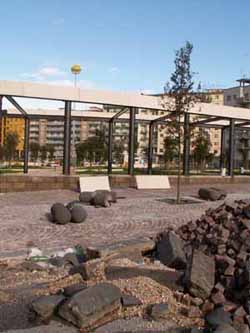 Yet
another train line, and if this one ever gets up and running, it will
be a boon for the city. Back in 1990, when Naples hosted some of the
games for the World Cup in soccer, they were to build a "rapid tram"
line from town out to the San Paolo stadium. Such a line would have
been an enormous asset—even after the games—to the city's
struggling transit system. Yet
another train line, and if this one ever gets up and running, it will
be a boon for the city. Back in 1990, when Naples hosted some of the
games for the World Cup in soccer, they were to build a "rapid tram"
line from town out to the San Paolo stadium. Such a line would have
been an enormous asset—even after the games—to the city's
struggling transit system.
Well, stations
went in and the underground tunnel was built, and they even ran a test
car or two down the tracks at the time, as I recall. Yet, the line never
opened; it was unfinished or too poorly built to operate, and for the
next decade, it just lay there gathering cobwebs below the surface of
the section of town known as "Fuorigrotta". It was, in the words of
the President of the Campania Region (of which Naples is the capital)
and mayor of the city of Naples during the 1990s, Antonio Bassolino,
who spoke about it the other day on television, a remnant of the great
"tangentopoli" scandals of the early part of that decade. (That's an
interesting word, translating approximately to "bribe city".) In other
words, everybody was on the take, and the money to do the job right
just disappeared.
That appears
to be changing. They have been working on the stations, track, and tunnel
for a number of months now and current plans call for at least part
of this renovated rapid light-rail transit line to be incorporated into
the city's transit system within two years. Finishing the entire line
will take about five years. There will be seven or eight stations along
the route, one that will connect the extreme western zone of Naples
in the area of the stadium and new university campus to the port of
Naples at Piazza Municipio. That is something that even the new subway
line does not do.
Myths;
Euro, the (2)
A myth
is a traditional story, possibly with historical basis, serving to explain
phenomena of nature or the customs and institutions of a people.
Admittedly, the tale of Peirithous being punished for the attempted
seduction of a goddess may not mean as much to us as it did to the ancient
Greeks, so we now have what are called 'Urban myths'.These are tales
that shed light on our own, modern-day 'customs and institutions'. The
most famous of these, as near as I can tell, involves the woman who
put her little rain-soaked doggie into a microwave oven to dry him off!
This supposedly reveals something about our relationship to our technology,
as does the one about the woman falling asleep under a full-body tanning
lamp and getting her contact lenses welded to her eye-balls.
With
that, I am now shattered to report that one of my most cherished stories
about Naples falls into this realm of make-believe; it is urban legend,
myth— not true, in spite of the fact that it should be and that
I personally know the guy who knows the man whose cousin's friend
heard about it.
| The
many small brush fires during the dry season in this area have
led to the extensive use of fire-fighting helicopters. They are
equipped with water scoops hanging from cables. They drop
down close enough to the surface of the Bay of Naples to scoop
up water and then fly off to dump it on the blaze. One day, high
up the slopes at the site of a fire which had been fought using
helicopters, a body was discovered. It was that of a scuba diver.
He had been swimming around when suddenly he was air-borne, torn
out of his element and subsequently dropped to his death. |
That's
the way I heard it, and that's how I've been repeating it all
these years, but now it seems that this story in one form or another
has been cited as 'true' in so many parts of the world that it can only
be false. Too bad. I really liked it. It had potential; the scuba-diver
remains might have been discovered by future paleontologists, who would
have then concluded that the sea level back at the turn of the 20th/21st
century around here was much higher than surmised. It also had
great literary value, since with slight modification, it could be
the opening of Hemingway's The Snows of Kilimanjaro:
No
one was able to explain what the leopard [scuba-diver] was seeking
at that altitude.
Car theft
has a couple of good stories connected with it.
| A man comes out of the house to go
to work in the
morning and finds his car gone, stolen. The next day, however, his car
is back in place with a note inside, apologizing for the emergency
which
made it necessary to temporarily borrow the man's car. To make amends,
the unknown 'thief' has left opera tickets for a performance at
San
Carlo theatre. Tickets for the whole family. Man takes family to opera.
Man comes back home. Man finds his house cleaned out, an easy task for
the thieves, since they were absolutely sure that no one would be at
home. |
Car
theft number two -(This one also involves the San Carlo theater
in Naples, but from a little different angle):
| Opening
night at the opera attracts the well-heeled. They show up in furs
and finery —and Mercedes', BMWs and Maseratis. Naturally,
when you go into the opera house, you park your big expensive
car in the lot adjacent to the theater and give the keys to the
'white cap', the parking attendant, a trusted and good-natured
underling living out his twilight years moving other people's
nice wheels in and out of tight parking spots. A few minutes into
the performance, one of those gigantic double-ramped trucks rolls
up and, with the help of the attendant and his splendid collection
of keys to other people's cars, loads up twenty or so of the shiniest
and most marketable ones, and roars off. Eye witnesses claim they
thought the cars were being towed away for parking violations. |
Gentleman
Thief/Robin Hood myth:
| An
elderly woman out shopping on Via Roma falls and hurts her
leg. She is immediately aided by two well-dressed gentlemen who
help her up and insist on driving her to the emergency room. While
she is being seen by a doctor, the two Good Samaritans wait for
her, minding her parcels, coat and purse. She comes out
and starts to call a taxi to get come. Her two 'friends' will
not hear of it, and they personally escort her home in their car.
When she wants to pay them for their troubles, they shrug it off
and tell her not to worry about it. They drive off. Only when
she opens her purse later that evening does she realize that her
benefactors have already helped themselves to her money. During
the affair they had every opportunity to rob the woman and
leave her, but they didn't, showing, instead, what was, no doubt,
genuine concern for her well-being. |
Euromyths:
In the
first week of January 2002, a number of tales about the new coin of
the realm, the Euro (€) were making the rounds:
The lack
of zeros in the new currency is confusing. So this guy walks
into a bank to buy new euros with his old lire and the bank teller undercharges
him by a factor of ten!
In one
story, the honest patron, not wishing to make the poor bank teller have
to make up the difference out of his own pocket at the end of the day,
comes in later and gives the money back.
The less
mythical version has one happy customer having a good laugh at the expense
of the poor Bank of Naples.
Then there
is the ATM machine spitting out 10 € notes stuck together,
giving you a lot more than you requested.
And some
banks are going back to the lire because they can't get enough euros
to do business.
These must
be true, because I heard it from the guy who heard it from the guy who...
Or how
about the battleship that disappeared from the port of Naples shortly
after the WWII? Not hijacked, you understand— it disappeared little
by little, piece by piece, day by day, apparently the victim of enterprising
scrap iron scavengers! Then, there was the time…
|
